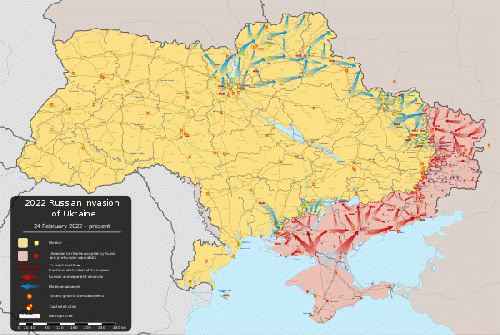
2022 Russian invasion of Ukraine - perhaps alterable, but only up to the national borders?
(Image by Wikipedia (commons.wikimedia.org), Author: Author Not Given) Details Source DMCA
By all objective measures, the Russia-Ukraine war is currently going badly, to very badly, for Russia. Russia continues to lose territory almost on a daily basis, starting almost on the day of its September 30th "sham" annexation of the four territories it occupies to the east and southeast of Ukraine. The reclamation of territory by Ukraine has slowed in recent days due partly to the need for Ukraine to regroup and strengthen its supply lines - something Russian forces have been startlingly unprepared and bad at doing, and part of the theme of this article which I will return to shortly. Russia has also dug into flatter, more difficult to mount an offensive territory - from Ukraine's point of view - and this too, speaks to the theme of this article on the advantage of the country, or in this case, region, being defended, in this case, de facto by Russian occupying forces. Donetsk, Luhansk, Kherson and Zaporizhzhia are currently more occupied by Russia than they are by Ukraine, though with the fast-moving facts-on-the-ground in Ukraine, that may change by the time you read this.
But territorial gains are not what I want to address here. Plenty of better-informed and experienced writers have written about that elsewhere.
But these same writers and others, have, over the years, and even decades and centuries, gotten their predictions wrong, and for the simple reason I will elaborate upon, having to do with the difference in force applied to defending one's country vs. mounting an offence into another country. The wildly disparate outcomes - even in the face of what look like overwhelmingly favored force advantages - simply cannot, I believe, be explained in any other way but the home front Advantage.
Afghanistan, sometimes called the "Graveyard of Empires" is a classic case in point, and especially useful since both Russia, and more recently, America, have suffered defeats after decade-plus wars in that country, which by all accounts, is vastly militarily inferior to either of its would-be conquerors. Afghanistan has had more-or-less, the same technological and military capability to defend itself against Russia as against the United States. In both cases, they were able to outlast and eventually defeat the two world's strongest military super-powers. It's not worth getting into strategic, geographical, or even relatively minor leadership nuances to explain why. These are false leads that military strategists and the civilian apparatus that rules over them, in both Russia and America, have followed, to their dismay and defeat. Having more information, better "intelligence," is not going to answer why Afghanistan, like Ukraine today, has been able to defeat a much larger, better equipped, richer, more developed opponent.
Predicting a war's winners by adding up military, geographic, and socio-economic advantages does not work.
More examples: Vietnam was a debacle for America, as it was for France before it. In both cases, America had every military and economic advantage: Vietnam was completely different terrain from Afghanistan - humid and warm, lush and forested vs. temperate even cold, mountainous, in Afghanistan. But the ultimate result was the same. It took years for the "true" Vietnam - North vs. South - to assert itself, and reunify in a bloody post-American war that continued for years, but it did. America's presence there was infamously captured by the sight of the last American helicopters lifting off from the soon-to-fall American embassy.
In the Korean war, the result was similar, but not as settled: American support for South Korea and Chinese support for North Korea resulted in a semi-proxy war that is unresolved to this day, unlike Vietnam. A pair of new countries split across the middle, uneasily facing each other, with weapons supplied by each of its backers across a tense DMZ.
(Note: You can view every article as one long page if you sign up as an Advocate Member, or higher).





